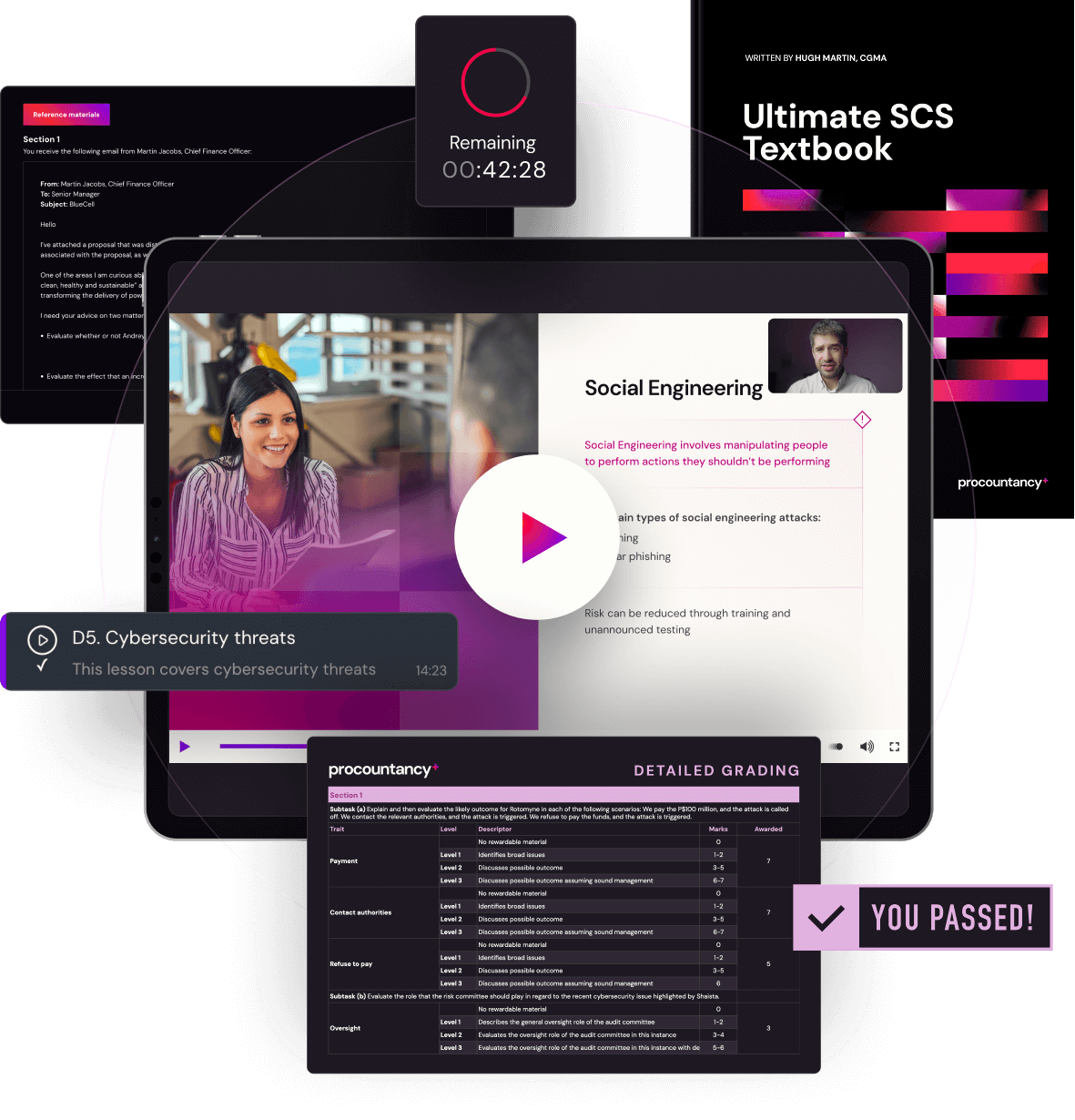May 10 • Hugh Martin
Why do students fail the CIMA Strategic Case Study (SCS)?
The CIMA Strategic Case Study is a challenging exam, find out from a leading tutor and expert why students fail the CIMA SCS and how students can overcome these issues.
Failing the CIMA SCS exam
The CIMA SCS exam is the final exam to pass to achieve the CGMA designation. It is not easy, and it requires a student to not only know the critical theory at the strategic level but also to understand how to apply it in a strategic context.
I've seen hundreds, if not thousands, of students pass the CIMA SCS exam, but I've also seen many fail on their first attempt. I often find it easier to learn from a negative, so let's see the common issues that tend to leave students with a fail result on their first try. I've also included some solutions to help prevent and overcome these common issues.
1. Failure to commit
Over the past few years, I've seen plenty of students who failed purely due to a lack of commitment to passing the exam. This can happen for various reasons, some of these reasons are unfortunate, but sometimes this issue crops up due to laziness and a lack of motivation.
Committing involves:
- booking the exam dates
- buying your tuition materials
- getting your study leave approved (if you have any).
Solution
Ideally, you should book your exam about ten weeks before the exam date. This creates a fixed commitment and should help motivate you to study. You can find the opening dates for bookings and the exam dates here.
It is also important to constantly remember and repeat to yourself that this is the LAST exam in the framework. You can give this exam everything and take it easy straight after. I've even booked vacations after exam dates to help keep me focused on the exam, knowing that I can relax once it is all done.
2. Lack of organisation
This is an unfortunate one. Sometimes, students fail because they do not organise themselves adequately. Organisation in this context refers to booking the exam, knowing the location of the test centre, and how you will get there. I've taught top-level students who failed their exams simply because they didn't get to the exam centre on time or became too flustered to sit the exam from arriving later than expected.
Solution
The solution to this issue is straightforward: you need to plan your exam far in advance. This seems common sense, but you'd be surprised at the number of students I've seen who fail their exams simply because they showed up to the exam centre on the wrong day or at the wrong time.
My recommendations are as follows:
- Always plan your trip to the exam centre, take your time if possible
- Arrive early if you can, and try to take the most reliable route possible.
- Please don't take your plan for granted, always have backups in mind.

3. Lack of practice
A prevalent issue for students at this level is an aversion to question practice. Instead of doing mock questions, some students tend to focus on reading and watching videos simply because they fear making mistakes. Some students who sit mocks may read the solution in advance or take the exam with Google or ChatGPT open in another tab. This results in a lack of practical experience in sitting the exam and can lead to a fail result.
Solution
The most effective way to study for any CIMA case study exam is to practice questions. Start your question practice off lightly by having study aids open and available. As time passes and you get to your mock papers, remove the study aids and take the mock exam like you would the actual exam.
Thankfully, our Ultimate SCS Review Course provides you with practice assessments before you do any mock papers. This way, your confidence is built up weekly so that you are confident enough to sit a mock paper without study aids.
4. Leaving answers blank
Sometimes, students fail because they didn't attempt a question. This can happen when the student feels they have inadequate knowledge of the topic or they may have run out of time. Inadequate knowledge can be overcome by studying technical material in advance. Becoming efficient with the plan requires a student to practice questions and make mental notes of how they will allocate their time in the exam.
Solution
Running out of time is an avoidable problem. At the start of every section, make a quick time plan. We suggest you read through the section for eight minutes. After that, you must divide your remaining time based on the percentages written beside each subtask. If you can stick to this plan, you'll avoid the above issue of having blank answers due to time mismanagement. We go further into detail on this in our SCS Ultimate Textbook.
5. Answering questions not asked
Some students like to answer questions that they want to see on the exam rather than the ones that have been asked. This occurs when the student memorises an answer they planned to "dump" in the answer box. This can also happen if the student fails to read the question correctly.
Questions on the SCS can be pretty nuanced, so you must pick up on the words being used, as one or two keywords could dramatically change the content of your answer.
Solution
The best way to approach this issue is to read all subtasks carefully. For the SCS, most subtasks are short. However, there's always a risk that students start writing everything they know about that subject area when they see a keyword. Ensure that you are reading each subtask slowly at least two to three times in the exam. There's a big difference between evaluating the suitability of a strategy and the challenges involved in evaluating the suitability of a strategy.
Hopefully, this helps. If you are looking to pass your CIMA SCS exam, please free to explore our resources or contact me through the website's Contact Us box.
Procountancy Copyright © 2025
Subscribe to our newsletter now!
Get weekly updates on live streams, news and more right in your mailbox.
Thank you!

